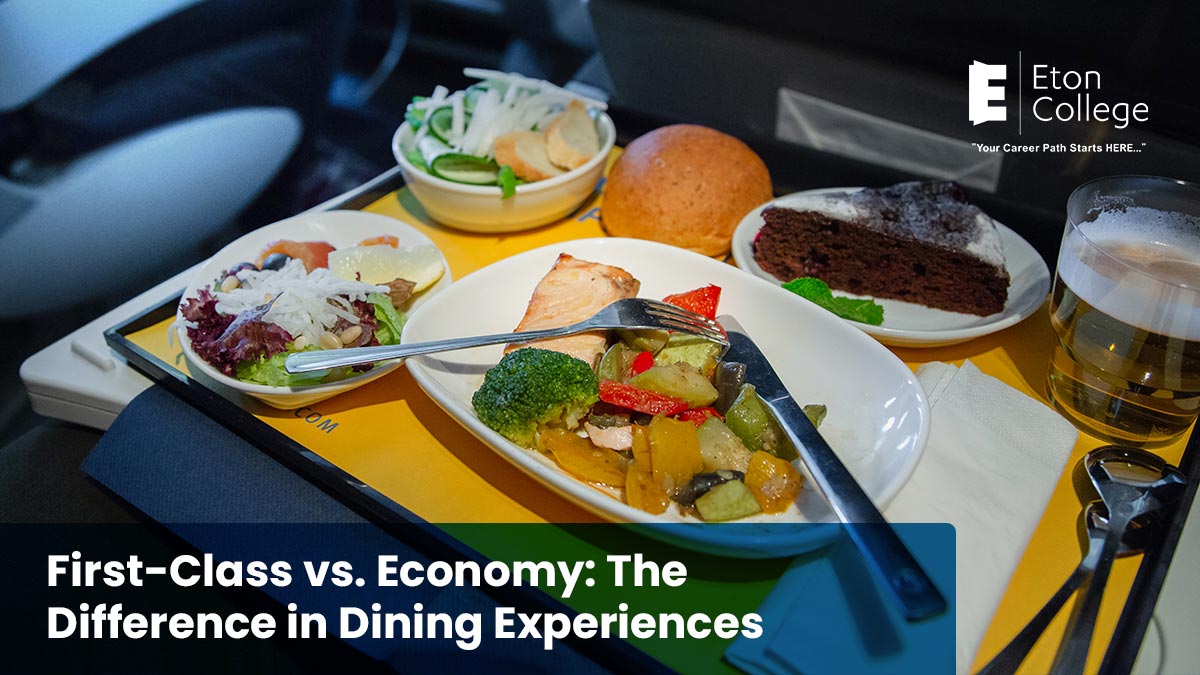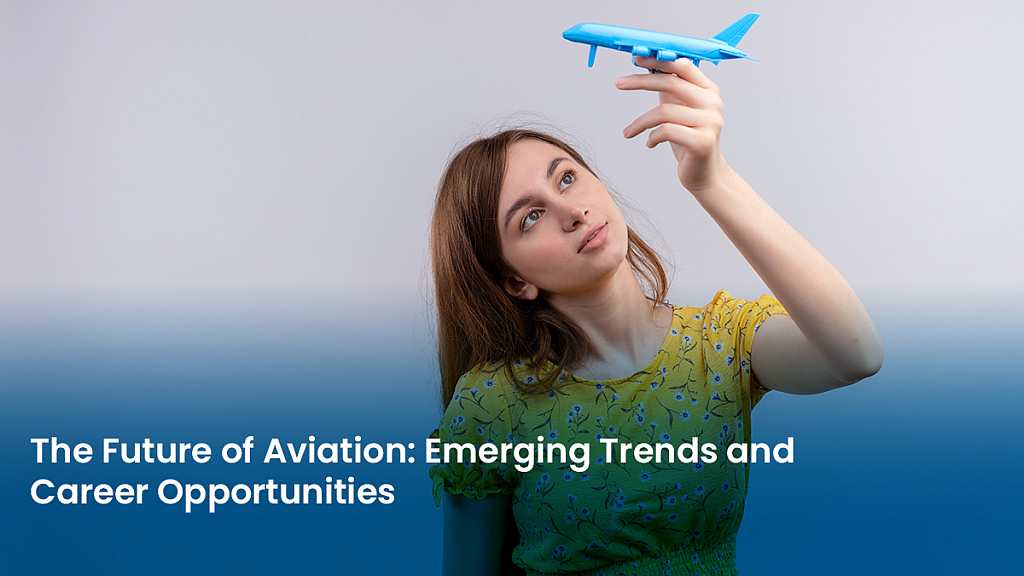Key Takeaways
- Economy-class meals are designed for efficiency and nutrition, focusing on simplicity.
- First-class dining offers a luxury travel experience with gourmet meals, personalized service, and premium ingredients.
- Flight attendants play a critical role in both environments, requiring strong communication and customer service skills.
- Eton College’s Flight Attendant Preparation Program equips students with the skills to succeed across various cabin classes, ensuring they are ready for careers in aviation.
When it comes to air travel, the dining experience plays a significant role in shaping a passenger’s journey. From gourmet meals served at 35,000 feet to pre-packaged meals designed for practicality, dining in the sky varies dramatically between first-class and economy cabins. This difference reflects more than just food—it’s a window into the priorities of the airline, whether it’s luxury, efficiency, or customer satisfaction.
For aspiring flight attendants, understanding these distinctions is essential. Each cabin class presents unique challenges and requires specific skills, from personalized service to efficient meal distribution. Knowing how to meet diverse passenger expectations not only enhances the flying experience but also paves the way for a successful career in the aviation industry.
Dining in First Class
Flying first class is an indulgent experience, with airlines ensuring their meals rival those found in high-end restaurants. The luxury travel meals goes beyond basic meal options, offering a variety of premium features:
- Gourmet Menus: Airlines collaborate with renowned chefs to design multi-course meals that reflect seasonal or regional cuisine.
- Elegant Presentation: Meals are served on porcelain dishes with metal cutlery, cloth napkins, and glassware, elevating the experience.
- Flexible Meal Times: Passengers enjoy on-demand dining, selecting meals when they prefer rather than following a strict schedule.
- Personalized Service: Cabin crews recommend wine pairings and attend to the individual preferences of each passenger.
Serving first-class passengers requires a high degree of professionalism. Flight attendants working in this cabin must exhibit refined customer service skills and effective communication to meet the needs of discerning travelers. They anticipate unspoken needs and provide thoughtful touches that elevate the passenger experience.
Dining in Economy Class
Economy class dining focuses on efficiency and accessibility. Airlines aim to serve large numbers of passengers while maintaining quality and accommodating dietary restrictions. Passengers in this cabin can expect:
- Pre-packaged Meals: Designed for practicality, these meals are compact and easy to distribute.
- Simple Beverage Service: Coffee, tea, water, and soft drinks are typically available, with a focus on quick service.
- Dietary Flexibility: Airlines offer meal options for specific dietary needs, such as vegetarian, halal, or gluten-free.
Flight attendants in economy class face the challenge of serving large groups under time pressure. Their role requires strong communication skills to ensure smooth coordination, along with quick problem-solving abilities. Handling the demands of this cabin also involves skills such as baggage handling and familiarity with airport ground staff operations, especially when managing overhead storage and assisting passengers with their luggage.
What Makes the Difference?
Several factors contribute to the stark difference in dining between economy and first class:
- Space and Equipment: The limited space in the economy galley makes it challenging to prepare elaborate meals. In contrast, first-class cabins often have additional space for meal preparation and plating.
- Ingredient Quality: Airlines allocate higher budgets for first-class meals, allowing access to premium ingredients such as Wagyu beef, truffles, or artisanal cheeses.
- Service Style: Economy meals are served quickly in pre-packaged trays, while first-class dining involves personalized service, with flight attendants presenting each dish with care.
- Customization: First-class passengers enjoy the luxury of customization—whether it’s selecting dishes or choosing their preferred wine, the experience is designed to cater to individual tastes.
The Role of Flight Attendants in the Dining Experience
Regardless of the class, flight attendants play a crucial role in ensuring a smooth dining experience. Their responsibilities go beyond dining comparison; they need excellent communication and customer service skills to accommodate special requests and handle passenger concerns.
The meticulous service in first-class requires attendants to excel at hospitality, while economy service demands efficiency and attentiveness. Both roles require advanced training, as mastering the art of in-flight dining is part of a flight attendant’s essential skill set. This includes handling difficult passengers, maintaining professionalism under pressure, and working with limited resources—all skills covered in a high-quality program.
How Eton College Prepares Future Flight Attendants for Success
At Eton College, we understand the challenges and intricacies of being a flight attendant. Our Flight Attendant Preparation Program equips students with the expertise to excel in both first-class and economy environments. From mastering the nuances of luxury travel meals to developing strong communication and customer service skills, our graduates are prepared for every scenario in the skies.
Our program also emphasizes practical knowledge, including dining comparison training and crisis management, ensuring future flight attendants are ready for the demands of modern air travel. Whether it’s delivering impeccable service in first-class or handling meal logistics in economy, Eton College students graduate with the confidence to navigate any situation.
Take Off with Confidence
Whether it’s serving a multi-course meal in first class or efficiently managing meal service in economy, cabin crews play a crucial role in shaping the passenger experience. If you’re ready to pursue a career in the skies, Eton College’s Flight Attendant Preparation Program can help you develop the skills and confidence to succeed.
FAQs
- What is the primary difference between first-class and economy dining experiences?
- The primary difference lies in the quality and variety of food options, presentation, and service level. First-class dining often includes gourmet meals, premium beverages, and personalized service, while economy meals tend to be simpler and more standardized.
- How do flight attendants contribute to the dining experience on flights?
- Flight attendants play a crucial role in enhancing the dining experience by providing attentive service, presenting meals professionally, and accommodating passengers’ dietary preferences and needs. Their communication and customer service skills are vital for ensuring a pleasant journey.
- What types of meals are typically served in first-class compared to economy?
- First-class meals often feature gourmet dishes prepared by renowned chefs, with options like caviar, filet mignon, and fine wines. In contrast, economy meals typically include simpler, pre-packaged options like pasta or chicken with a side salad and dessert.
- Are there any additional amenities provided in first-class dining?
- Yes, first-class passengers often enjoy amenities such as tablecloths, high-quality cutlery, and personalized service. Some airlines even offer multi-course meals and a wider selection of beverages, including specialty coffees and premium wines.
- How can aspiring flight attendants prepare for providing exceptional dining service?
- Aspiring flight attendants can benefit from enrolling in a comprehensive flight attendant program, which teaches essential skills such as customer service, communication, and problem-solving. Programs like the one offered at Eton College help students develop the expertise needed to excel in the aviation industry.





